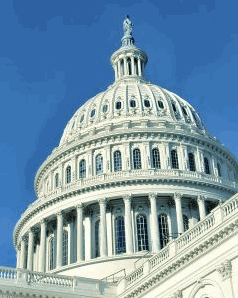What's a Fiscal Authority to Do?
by Brandon Fuller The likelihood of slow growth or a recession in the United States has policymakers looking for ways to soften the blow. There are two basic ways the government can stabilize output: monetary policy (changes in the money supply and interest rates) or fiscal policy (changes in government taxation and spending). The U.S. monetary authority, the Federal Reserve (or Fed), responded to the threat of recession by lowering interest rates. Lower interest rates reduce the cost of borrowing, accommodating investment and consumption spending during downturns (with the added benefit of lowering the value of the dollar and thus boosting U.S. exports). The timing and magnitude of interest-rate changes are always tricky, but even if rate cuts don't avert a downturn altogether, they'll almost certainly reduce the depth and length of a recession.
The likelihood of slow growth or a recession in the United States has policymakers looking for ways to soften the blow. There are two basic ways the government can stabilize output: monetary policy (changes in the money supply and interest rates) or fiscal policy (changes in government taxation and spending). The U.S. monetary authority, the Federal Reserve (or Fed), responded to the threat of recession by lowering interest rates. Lower interest rates reduce the cost of borrowing, accommodating investment and consumption spending during downturns (with the added benefit of lowering the value of the dollar and thus boosting U.S. exports). The timing and magnitude of interest-rate changes are always tricky, but even if rate cuts don't avert a downturn altogether, they'll almost certainly reduce the depth and length of a recession.But what, if anything, can the fiscal authority—Congress and the President—do to assist the economy? According to Fed chair Ben Bernanke, "Fiscal action could be helpful in principle, as fiscal and monetary stimulus together may provide broader support for the economy than monetary actions alone." (Read this New York Times article for more.) However, Bernanke is hedging a bit here. By saying that tax cuts or spending increases "could be helpful in principle," he implicitly acknowledges that such measures may be ineffective, or even harmful, in practice. The process of agreeing on and passing legislation limits the usefulness of fiscal policy for stabilizing mild fluctuations in economic output. By the time our representatives haggle over and pass legislation, the downturn may be over or the resulting policy may reflect political rather than economic considerations. For this reason and others, recent commentaries by Greg Mankiw and Robert J. Samuelson argue that we should leave the Fed to address mild ups and downs in the business cycle, reserving fiscal policy for deep or prolonged recessions.
Discussion Questions
1. Limitations of fiscal policy aside, Bernanke seems to understand that politicians seeking a track record to run on will often favor policy action over informed inaction. What advice does he give policymakers who are eager to implement fiscal policy?
2. Three specific types of "lag" may delay the beneficial effects of economic policies. The recognition lag is the time it takes us to figure out we're in an economic pickle. We often don't know that we're in a recession until months after it's started. The implementation lag is the time it takes policymakers to agree on and implement policies. The impact lag is the time it takes a policy to work its way through the economy and affect economic output and unemployment. For example, an increase in government spending on highway construction will show up as additional output over the entire life of the project, not all at once. How might these lag times differ between monetary and fiscal policy?
3. Plotting economic output over time reveals two basic observations: the smooth upward trend in output growth over the long haul, and the up-and-down wiggle of output in the short term. To paraphrase Aplia's founder Paul Romer, it's easy to lose sight of the trend for the wiggle. Policymakers can get so wrapped up in temporary economic tumults that they lose focus on the bigger picture. If we're headed for recession, odds are that it will be mild by historical standards and the Fed will have plenty of policy ammunition to soften its adverse effects. Meanwhile, small changes in the long-run rate of economic growth have large impacts on future living standards. Given that, what policies would you recommend the action-minded fiscal authority focus on to improve the long-term growth prospects of the U.S. economy?
For more on the appropriate role of fiscal policy, listen to Bloomberg’s interview with Stanford economist John Taylor.
Labels: Economic Growth, Fiscal Policy, Global Economic Watch, Interest Rate, Monetary Policy



0 Comments:
Post a Comment
<< Home